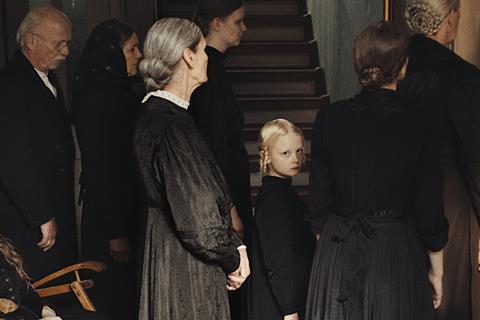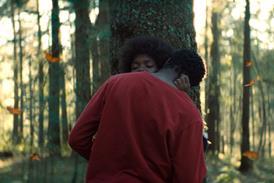Mascha Schilinski’s Cannes Competition title is ‘a work of thrilling ambition’

Dir: Mascha Schilinski. Germany. 2025. 148mins
At times it seems as though tragedy has seeped into the very walls of the sprawling farmhouse in Germany’s Altmark region where this story unfolds, only to leach out and pollute the happiness of each subsequent generation. At others, it feels as though the decades that separate the lives of the four girls who are the film’s focus are fluid, and that the barrier of time is somehow permeable. What’s certain is that Sound Of Falling, the striking second feature from German director Mascha Schilinski, is a work of thrilling ambition realised by an assured directorial vision.
Announces Schilinski as a talent of considerable note
Schilinski is something of a dark horse contender in this year’s Cannes Competition. Her 2017 debut, Dark Blue Girl, premiered at Berlin and picked up a handful of prizes at smaller, specialist events. She has since directed episodes of German television series Cologne PD. Sound of Falling is likely to raise Schilinski’s profile, announcing her as a talent of note. The film is slated for release in Germany in September and should generate interest among arthouse distributors and streaming platforms in other territories.
The spread of the intertwined, patchworked stories extends over approximately a century, with the earliest taking place within a farming family preparing themselves, with a shocking finality, for the outbreak of the First World War. Death looms large over the children of this austere community; an All Souls Day ritual pays tribute to their many deceased siblings and other relatives, all commemorated with morbid group photographs in which the bodies are dressed in their finery and propped up on a sofa.
Alma (Hanna Heckt), the elfin, flaxen-haired protagonist of this section, becomes troubled by one picture, showing her pinched, mute mother posing with the inert body of a child who is the spitting image of her. Her older sisters tease her – the dead girl in the photo is Alma, they say, seeding a preoccupation with her own mortality. In one extraordinary sequence, the sisters play a trick on a housemaid, nailing her indoor clogs to the floor. The good-natured maid leaps up and chases the squealing and scattering children through the mossy gloom of the house. There’s a tumult of excitement – then just as suddenly, a quiet falls, and Alma finds herself alone in the emptiness like a little ghost.
In another time, years later, teenage Erika (Lea Drinda) neglects her pig-tending duties because of her fascination with her amputee uncle, Alma’s older brother. Later, in the 1980s, Erika’s niece Angelika (Lena Urzendowsky) finds herself the focus of the unwelcome attentions of her uncle Uwe (Konstantin Lindhorst) and his gauche son Rainer (Florian Geißelmann). And in the final, contemporary story, the clan’s connection to the farm has been severed, and newcomers, a family with two daughters, have bought it to renovate. But the stain of sadness on the building is hard to shift. The casual horrors endured by the women of the earlier generations – dairy maids are ‘made safe’ for the men by an operation to render them infertile – are the kind of traumas that can leave a mark for decades to come.
Schilinski threads together the different timelines with recurring themes and images. The trickle of sweat caught in a belly button; the innocuous terrors of the hayloft; the loaded significance of group photographs; the ominous pull of the nearby River Elbe which, for some of the stories at least, marks the border between East and West Germany.
Water also figures prominently in the soundscape, building to a roaring crescendo that bursts through the picture like a wave of dread. It’s a work of striking beauty – the subdued velvety light of the farmhouse interiors is a backdrop against which the children glow like pearls; the wholesome golds and fecund greens of the arable fields suggest a land bursting with life, and shadowed by death.
Production company: Studio Zentral, ZDF
International sales: Mk2
Producers: Lucas Schmidt, Lasse Scharpen, Maren Schmitt
Screenplay: Mascha Schilinski, Louise Peter
Cinematography: Fabian Gamper
Editing: Evelyn Rack
Production design: Cosima Vellenzer
Music: Michael Fiedler, Eike Hosenfeld
Main cast: Hanna Heckt, Greta Krämer, Filip Schnack, Helena Lüer, Anastasia Cherepakha, Susanne Wuest, Gode Benedix, Luzia Oppermann, Bärbel Schwarz, Liane Düsterhöft, Lea Drinda, Martin Rother, Lena Urzendowsky, Florian Geißelmann, Konstantin Lindhorst, Claudia Geisler-Bading, Andreas Anke, Laeni Geiseler, Zoë Baier, Ninel Geiger, Luise Heyer, Lucas Prisor
























